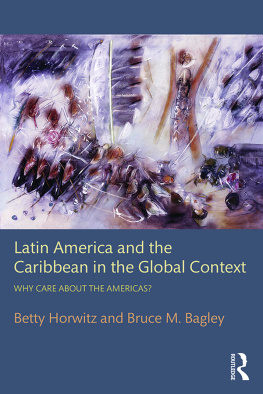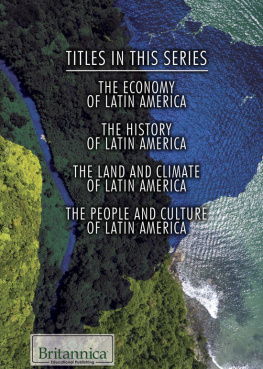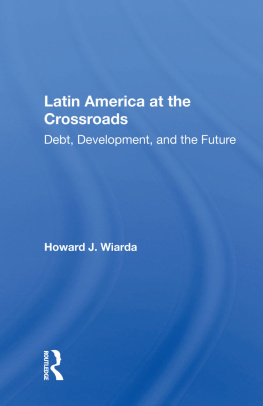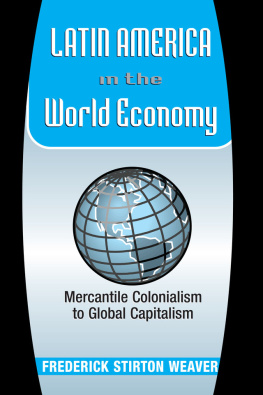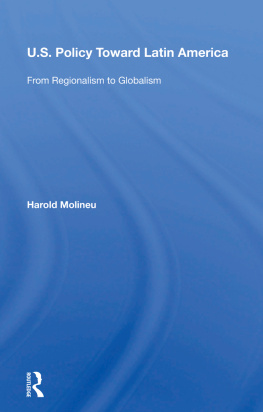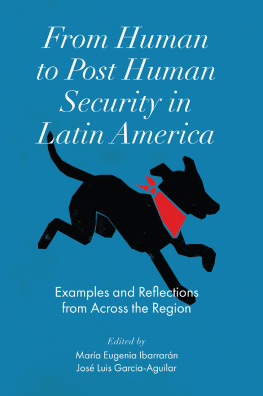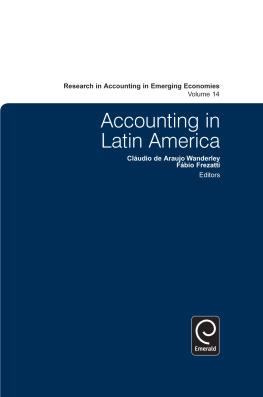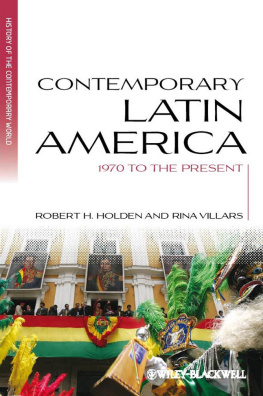Latin America and the Caribbean in the Global Context provides state-of-the art analysis interpreting the transformations of the regions place in world poli-tics and the global economy through the lenses of contemporary theories of international relations. Fundamental issues such as the quality of democratic governance and transnational drug trafficking, the regions quest for greater autonomy in a world scene marked by the war against terrorism, Chinas rise as a global power and challenges to US hegemony receive particularly acute treatment.
William C. Smith, Professor of Political Science, University of Miami, Editor,
Latin American Politics and Society
It is extremely fortunate that this book brings to the forefront a core argu-ment that is seldom considered by mainstream IR studies and comparative policy: the relevance and contribution of Latin America and the Caribbean to both world politics and democratic dynamics. The authors combine theory and practice, a historical and contemporary perspective covering multiple key issues across the whole area, with a singular purpose that they have been able to achieve: to thoroughly demonstrate why the post Cold war chan-ging reality of LAC is significant; first to itself, to the Inter-american system, and to global affairs. In the end, Bagley and Horwitz show that the study and understanding of the region can be academically rigorous and intellectually empathetic.
Juan Gabriel Tokatlian, Universidad Torcuato Di Tella,
Buenos Aires, Argentina
LATIN AMERICA AND THE CARIBBEAN IN
THE GLOBAL CONTEXT
Current perspectives on Latin Americas role in the world tend to focus on one question: Why is Latin America and the Caribbean always falling behind? Analysts and scholars offer answers grounded in history, economic underdevelopment, or democratic consolidation. Horwitz and Bagley, however, shift the central question to ask why and to what extent does Latin America and the Caribbean (LAC) matter in world politics, both now and in the future.
This text takes a holistic approach to analyze Latin Americas role in the international system. It invokes a combination of global, regional, and sub-regional levels to assess Latin America and the Caribbeans insertion into a globalized world, in historical, contemporary, and forward-looking perspectives. Conventional international relations theory and paradigms, intro-duced at the beginning, offer a useful lens through which to view four key themes: political economy, security, transnational issues and threats, and democratic consolidation. The full picture presented by this book breaks down the evolving power relationships in the hemisphere and the ways in which conflict and cooperation play out through international organizations and relations.
Betty Horwitz was a Lecturer in the Department of International Studies at the University of Miami, where she received her Ph.D.
Bruce M. Bagley is Professor in the Department of International Studies at the University of Miami. His research interests are in U.S.-Latin American relations, with an emphasis on drug trafficking and security issues.
First published 2016
by Routledge
711 Third Avenue, New York, NY 10017
and by Routledge
2 Park Square, Milton Park, Abingdon, Oxon OX14 4RN
Routledge is an imprint of the Taylor & Francis Group, an informa business
2016 Taylor & Francis
The right of Betty Horwitz and Bruce M. Bagley to be identified as authors of this work has been asserted by them in accordance with sections 77 and 78 of the Copyright, Designs and Patents Act 1988.
All rights reserved. No part of this book may be reprinted or reproduced or utilised in any form or by any electronic, mechanical, or other means, now known or hereafter invented, including photocopying and recording, or in any information storage or retrieval system, without permission in writing from the publishers.
Trademark notice: Product or corporate names may be trademarks or registered trademarks, and are used only for identification and explanation without intent to infringe.
Library of Congress Cataloging in Publication Data
Names: Horwitz, Betty, 1956- author. | Bagley, Bruce Michael, author.
Title: Latin America and the Caribbean in global context : why care about what happens in the Americas? / Betty Horwitz and Bruce Bagley.
Description: New York, NY : Routledge, 2016. | Includes bibliographical references and index.
Identifiers: LCCN 2015034325| ISBN 9780415877442 (hbk) | ISBN 9780415877459 (pbk) | ISBN 9780203855508 (ebk)
Subjects: LCSH: Latin AmericaForeign relations. | Caribbean AreaForeign relations. | Latin AmericaPolitics and government. | Caribbean AreaPolitics and government. | Latin AmericaEconomic conditions. | Caribbean AreaEconomic conditions.
Classification: LCC F1415 .H67 2016 | DDC 327.8dc23
LC record available at http://lccn.loc.gov/2015034325
ISBN: 978-0-415-87744-2 (hbk)
ISBN: 978-0-415-87745-9 (pbk)
ISBN: 978-0-203-85550-8 (ebk)
WE DEDICATE THIS BOOK TO OUR COMPANIONS
AND CONFIDANTS, OUR SPOUSES OF OVER
FORTY YEARS AND COUNTING, ROBERTO
HORWITZ AND ANNETTE LOUISE TRAVERSIE
BAGLEY. WE WOULDNT BE HERE WITHOUT
THEIR LOVE AND SUPPORT.
Figures
Tables
We are grateful to Routledge Publishers for their encouragement, advice and comments. We are thankful for the help of Rocio Alejandra Rivera Barradas and Yulia Vorobyeva, Ph.D. students of the Department of International Studies at the University of Miami and Clara L. Diaz, for their help with our graphics and tables, and Rosa Schechter for her counsel.
Why Do Latin
America and the
Caribbean Matter?
Lets think about the whole earth
pounding with love on the table.
I dont want blood to soak
the bread, beans, music,
again: I want the miner,
the little girl, the lawyer, the doll
manufacturer to accompany me,
lets go to the movies and set out
to drink the reddest wine.
I dont want to solve anything.
I came here to sing
so that youd sing with me.
Let Woodcutter Awaken from Canto General, by Pablo Neruda, translated by Jack Schmitt. 2011 by the Fundacion Pablo Neruda and the Regents of the University of California. Published by the University of California Press.
Why Care About What
Happens in Latin America and
the Caribbean (LAC)?
For the last two hundred years, most observers of world affairs wrote off the nations of Latin America and the Caribbean (LAC) as minor actors on the worlds economic and political stages.
It is true that once they gained their independence from Spain and Portugal during the second decade of the nineteenth century and through the nineteenth and most of the twentieth centuries, LAC remained poor, underdeveloped, plagued by internal conflicts and territorial disputes with neighbors, dependent on commodity exports, prone to dictatorial or authoritarian regimes, and essentially subordinate to the dominant power of the United States.
They were, in effect, rule takers rather than rule makers in the international system, constantly overshadowed by American hegemony.
The central argument of this book is that by the second decade of the twenty-first century, LAC and its role in and importance to the international system has changed dramatically for the better. Today, some of the countries of LAC are significantly more importantin both global economic and security termsthan at any time in the regions history. LAC is increasingly able to exercise national and regional autonomy in international affairs.
Furthermore, if recent history is any indication, the U.S. is likely to continue to be the major economic, political, and military power in the world, albeit less engaged than in the past. Its low rate of exports, its increasing self-reliance (especially in terms of energy), and its experiences over the past decade will cause it to be increasingly cautious about economic and military involvement in the world.
Next page
